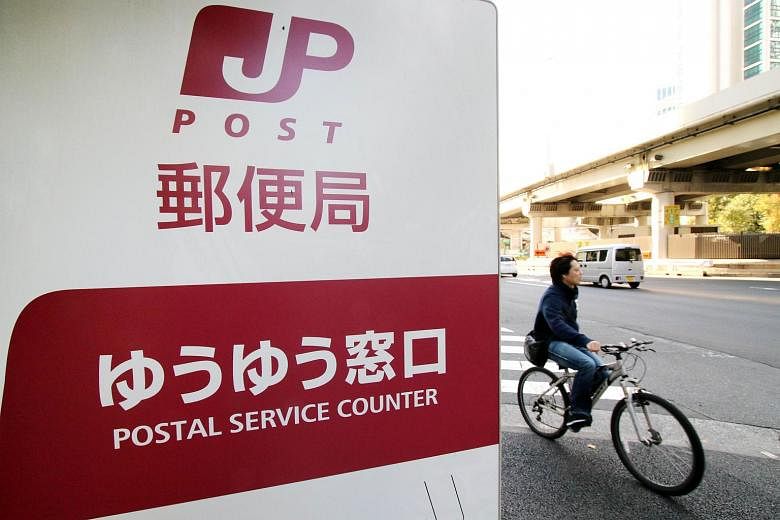TOKYO (BLOOMBERG) - Japan is privatising its postal service.
The size of the initial public offering (IPO) when it starts trading on Wednesday (Nov 4) will make it the biggest IPO in the world this year - in fact the biggest since Alibaba Group Holding went public in September 2014. Selling shares in the mail delivery and financial giant, whose origins date back to 1871, has been a decade in the making.
Most of share sales are aimed at individuals - part of Prime Minister Shinzo Abe's goal to get people to invest more of their savings. He is counting on the listing to be a success that will lure investors to further offerings in the years ahead.
Yet the three Japan Post companies (holding company, banking unit and insurance) have obstacles clouding their growth prospects. Here are eight numbers highlighting the IPO and some of the challenges:
1.44 trillion yen (S$16.76 billion)
That's the amount expected to be raised from the deal. The size makes it Japan's largest IPO this century, its biggest privatisation since 1987, and the largest in the world this year.
24,464 branches
Japan Post has more branches than all of the country's banks combined. It is required to maintain universal service, even in the remotest areas, making it tough to cut costs by closing branches or paring its workforce of more than 200,000 full-time employees.
18.2 billion pieces of mail
Japanese people sent this many letters, packages and postcards in the year ending in March. That may sound like a lot, but it is three billion fewer than seven years ago. To cope with the advent of e-mail, texting and social media, Japan Post is focusing on freight transport and expanding abroad. It bought Australian logistics company Toll Holdings this year for A$6.5 billion (S$6.5 billion), its biggest acquisition.
178 trillion yen (S$2.07 trillion)
With this much in deposits, Japan Post has more deposits than any other financial institution in the country. What it does with those assets has implications for banks and financial markets.
About half are parked in Japanese government bonds. The bank has begun shifting to other securities to boost returns, and has asked for permission to start making loans to homebuyers and companies, a move that would challenge the country's already over-saturated banking industry. What's more, ruling-party lawmakers want to let people deposit more than the current limit of 10 million yen, which could suck savings from regional lenders.
23 per cent
That's how much Japan Post forecasts its profit will slump in the year ending in March. It expects returns on its Japanese government bond holdings to wane as interest rates decline. Earnings rely mainly on its banking and insurance units, with mail contributing the least.
0.47 times book value
This low price is the IPO value of Japan Post's banking unit, or less than half the value of its assets if they were to be sold off. That's cheaper than the average 0.70 for Japan's three biggest banks. With a majority of shares being offered to retail investors - also known as voters - the government has reason to make sure the share price goes up when it starts trading on Nov 4.
86,500 motorbikes
One of the most common sights and sounds in Japan is of the postmen and women buzzing around on motorbikes delivering mail every day.
79 years old
That's the age of Mr Taizo Nishimuro, president of Japan Post Holdings. The former CEO of Toshiba joined Japan Post two years ago to oversee the IPO. With the task almost done, it remains to be seen how long he will continue in the job.

